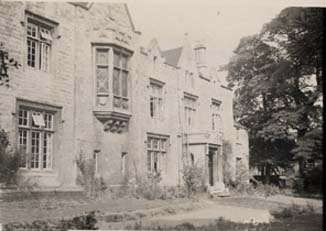Hatton Home For Boys, Wellingborough
Hatton Home For Boys, WellingboroughBroad Green, Wellingborough, Northamptonshire (1913 - 1944) Hatton Hall was given to the Society in 1913 by Mr Harrison, who also contributed £500 towards the building's refurbishment. The Society was keen to preserve the original architecture of this Tudor mansion, and only moderate alterations were made. Thirty boys from the recently closed Islington Home moved to Hatton Hall in the Autumn, and the official opening ceremony was held on 14 May 1914. On this day, the Bishop of Leicester conducted a dedication ceremony in Hatton Hall's schoolroom, before Mrs Sotheby declared the Home to be 'open'. More children arrived throughout the year, until there were 40 boys (aged 8-15) living in the Home. Hatton Hall hosted a garden party in the summer of 1915, to which the whole town was invited. Tea and cakes were served on the lawn, before the boys entertained the guests with sports and running competitions. According to a report of the event, the large attendance proved that 'the Home has through its boys and staff thoroughly won the heart of the Wellingborough.' The garden party also helped the Home to raise funds, and many guests arrived with donations of groceries and money. After this success, the Hatton Hall summer party became an established annual event. As with other boys' homes, the Scout movement was an important influence at Hatton Hall. The boys often went on Scout camp, where they could learn survival skills and experience plenty of outdoor exercise. In 1921 they even marched the 22 miles to their camp, whilst all their equipment was driven from Hatton Hall by 'motor lorry'. The Home's Scout troop had their own Latin motto 'Vive ut vivas', which translates as 'Live that you may live'. The boys were re-housed in other children's homes in 1944 when Hatton Hall was converted into a reception and club centre and was used as a temporary home for children waiting to be placed with foster parents. By 1947 Hatton Hall was a staff training college and home for boys and in 1951 it became a home and hostel for boys before closing in around 1958. |




